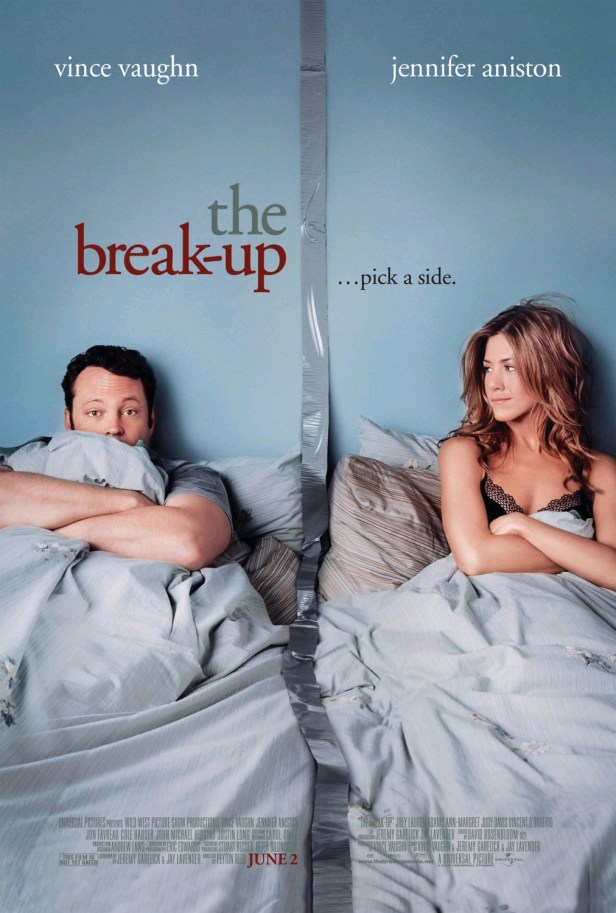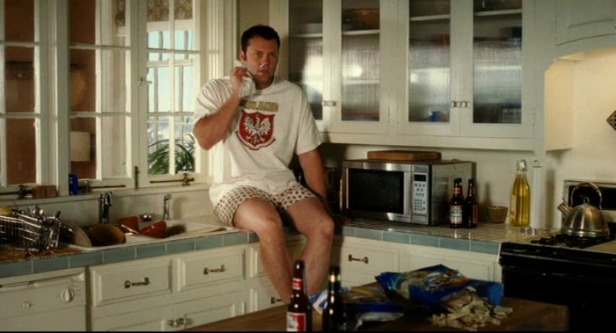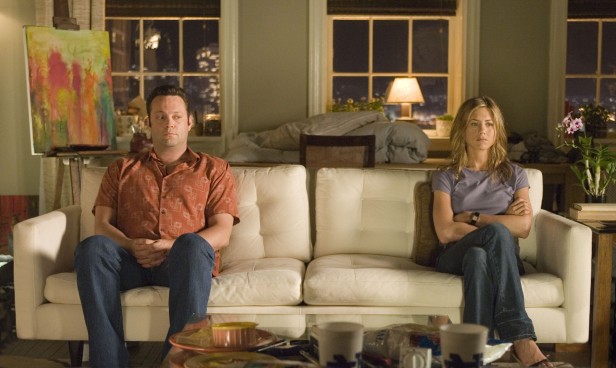
Einstein would probably be disturbed to know that his theory of relativity comes to mind when I try to approach this re-view. Ten years is a strange thing. When I think about this movie, it doesn’t seem like that much time has passed since its release; when I think about my life when I first saw this movie, it seems like forever. I guess a person can do a lot of work in ten years.
In the spring of 2006, I was living in Playa Del Rey, California, in a center-courtyard building named the Twin Dolphins. It was near the beach, which I rarely went to, and had a pool I never used. I had gone west, but I rarely went anywhere. In my apartment lived a dog with improbable skin allergies, two cats deeply in love with one another, a man we’ll call Joe, my infinite sadness, and me. Joe was charismatic, and handsome, and really great in bed. He was also insecure, cruelly adolescent, and unwilling to change. He was a golden boy— everyone loved him for some reason, and he always managed to skate by. He had always been taken care of, so he never put in more effort than that required.
When we met, I had half-black and half-blonde hair; I wore a leopard coat and a septum ring. Two years later he’s asking me, Did I have to always dress so weird? I tried to be less weird. Speaking of weird, I have a thing where pillowcases need to be put on in a certain direction and he knew it, and he would put them on wrong anyways, sometimes carelessly and sometimes on purpose. Regardless, I cleaned (he never cleaned), and I cooked (he never cooked), and I worked and I made sure that everything got done and that he had all the things he needed to be happy, and he existed, and that was in his estimation, enough.
Once, I lost my job and he paid a little more than half the rent and bills for a month because unemployment didn’t cover everything. His job was enough. Once, he offered to buy me something I had wanted for ages for my birthday, and he reserved it and everything, but then he “forgot” about it. But I still wanted it, so I went and bought it for myself. It was still there, because of his reservation. That was enough. And once, our refrigerator stopped working and we had to purchase a new one: I was standing in the aisle of the discount appliance store somewhere on Lincoln Boulevard, and it came upon me in waves, my face hot, throat constricted, I didn’t want to, I couldn’t. The idea of spending months trying to pay off this literal burden, this cartoon anvil, this empty box just waiting for me to be stuffed inside it, a sacrifice. I slid down the side of a washer and sat on the floor silently sobbing. Joe paid for the refrigerator, assuming the cost was the reason for my tears. It was kindness, I try to remember that.
I tried a million times to change him. I just wanted him to really BE there with me. I would be the catalyst for this transformation, and he would stop laughing at me when I sobbed, tired of asking for help, and he would stop drinking so much, and he would stop having secret online relationships instead of just trying to BE in this one. I would be the catalyst, and he would be changed. But I forgot that catalysts get burned up in the reaction.
So after some fight I don’t remember, I took myself to the movies. I needed to get out of the house, and so I went to the Marina theater and saw The Break-Up. It was, I don’t know, there. I don’t love anyone in it, it didn’t seem that appealing I don’t think. But there it was, and there I was. It couldn’t be worse than what was waiting at home, so I bought some sour straws (better than sour grapes) and settled in. I remember: baseball games, the wrong lemons, “I want you to want to wash the dishes,” a naked walk-by, a general feeling of sadness that they couldn’t get it together, them seeing each other a year later. Mostly I remember feeling very deeply that Jennifer Aniston’s character was aggrieved in this movie, that she was right and he was wrong and now I’m not sure if I missed “his side” because did they make movies where the guy was wrong? Where I could just identify with her and not also be crazy or something? And I have remembered that, and the dishes. I guess we’ll see.

This movie is 100% about growing up and emotional labor. Not familiar with emotional labor? Well, let me put it this way. Chances are, if you were raised as or to be a “feminine” type person in America, you’re doing it, a lot of it, all the time. It’s all the things we’re “just naturally better at.” Except we’re not. It’s work, and we’re taught to do it, and it’s exhausting, and we deserve recognition, and for another adult to do at least some of that shit at a certain point.
Emotional labor is the advice and solutions we are expected to always have, the multiple schedules we maintain so that life can go smoothly, the internalized knowledge of what everyone likes/dislikes, wants and needs, the endless patience, the knowing what needs to get done, the asking people to do it because they apparently don’t know even though how can they seriously not know that groceries need to be purchased or put away or trash needs to be put out? So then it’s the just doing it ourselves because it’s easier than explaining and waiting and reminding, the rebranding our feelings about these things so that our partners and families might hear the problem instead of the hurt.
This inequity and expectation applies in a million situations—patriarchal, racist, sizeist, ableist… But it is pervasive on an intimate level, in relationships, where one party has been labored over and the other has been taught to labor, and the cycle continues.
While the film as a whole isn’t that good, the serious interactions in it are pretty good depictions of this imbalance. We see Brooke (Jennifer Aniston) and Gary (Vince Vaughn) meet, and then a picture montage of their relationship over the opening credits. They each have a day at work, and then in their apartment, she is cooking and he returns home from work, opens a beer, and sits in front of the TV, explaining he’s tired and just needs some time before their guests arrive. This *is* actually a fair request, except that she’s also tired, and has come home from work, cleaned up, and cooked. She managed the dinner in its entirety, planning to execution, and would just like for him to set the table. She tells him what she sees happening, makes a clear request, to which he gives her the ol’ “yes dear,” tells her he will help, and then does exactly what he wanted—that she specifically requested to avoid.
Sometimes it’s not this direct; it’s poorly completed requests so they won’t be requested again. It’s partially completed requests (the lemons, in this case) met with again, what is actually a reasonable solution that just becomes unreasonable in this particular situation. She asked for 12 lemons, he brought three. It was the one thing she asked for, and he didn’t manage to get it done; and his solution was to subtly insult her request and her efforts, instead of apologizing.
After the dinner party, she begins to clean up and he doesn’t want to. This is the infamous, “I want you to want to wash the dishes.” But he’s right — no one wants to wash the dishes. It’s not about that. And yet the dishes have to get washed, so someone’s going to have to wash them. And if he doesn’t want to, it’s always her, which is not an equitable distribution of labor. She just wants him to want to help, to take on some of the crap tasks: aka to see his place in the relationship as an equal, as a partner. But he doesn’t.

From there, we get the breakup. It devolves, turns ugly. There are some funny bits but mostly it’s them hurting one another instead of just communicating directly. They play games, figurative and literal. At one point they host a friends’ game night, and Gary’s in charge of snacks, so they end up with chips, gum, Kraft singles, a package of baloney and water. When Brooke’s turn at Pictionary comes up, she draws a shoe with another smaller shoe-ish thing inside it; Gary keeps shouting shoe and is furious because she didn’t draw something different when he wasn’t right. His refusal to budge from his point-of-view prevents him from seeing that the answer is a sock.
The climactic showdown for Brooke is an all-in, where she once again puts in the effort, setting everything up, making the invitation, leaving instructions, providing everything required. All Gary has to do is show up. Gary’s friend sums it up when he says, “She probably just wanted you to show the respect of not standing her up or some shit. It’s her fault, she should have expected it from you.”
And finally he tries after it all, to fix things. He didn’t know, until it was too late. He realizes, he figures some things out. Her tears made a difference. But I have to say that is some bullshit. You have to hurt someone badly to realize you’re hurting them? When they keep saying “YOU’RE HURTING ME,” and ask you to do things differently? Maybe you should get some therapy.
They can’t fix it. She moves away, he grows up. But a while later, they cross paths, and there’s implications of potential to rebuild. They never didn’t love one another, after all. It was just about (as it always is) who had what to give.
I vaguely wish this movie could be remade with a woman writer, with less interest in comedy and more interest in realism. Imagine a movie that focused on the discomforting feeling of wanting someone to do more, and hear more—but never being able to get them to understand that. It couldn’t be a comedy: it’s a tragedy, a horror. It would be brutal.
Catalyzing agents get burned up, but something is created from that energy. The Monday after I saw this movie, while waiting in line for a burrito, I turned to my right and told Joe I didn’t want to be his anymore. It’s been ten years, but to be honest, I still get nervous when I see a red motorcycle, or a striped hat. But I also wear my leopard coat, and I still don’t own a refrigerator. Things aren’t perfect — I’m not sure I’ve figured out how to communicate 100% of the time, or how to divide emotional labor, but when I re-viewed this movie, I watched it with someone on a Saturday night, and when I woke up Sunday morning, he was washing the dishes.
Random Notes:
– The two guys who allegedly wrote this screenplay (Jeremy Garelick and Jay Lavender) have like zero other writing credits. The story was developed by them and Vince Vaughn—perhaps he wrote the script and gave them the credits?
– In support of my theory that this is an anomaly of a movie that shows a female POV, there is a thread on IMDb calling this “the most male-bashing movie ever made!!!”
– Brooke goes on fake dates on the advice of her crazy art-dealing boss, who tells her, “It’s not cubism, it’s not surrealism, it’s paint by numbers.” – My favorite line of the whole movie: “You can’t take a pitch pipe out of a guy’s hand when he’s in the middle of a very funky groove. You can get hurt doing something like that.”

